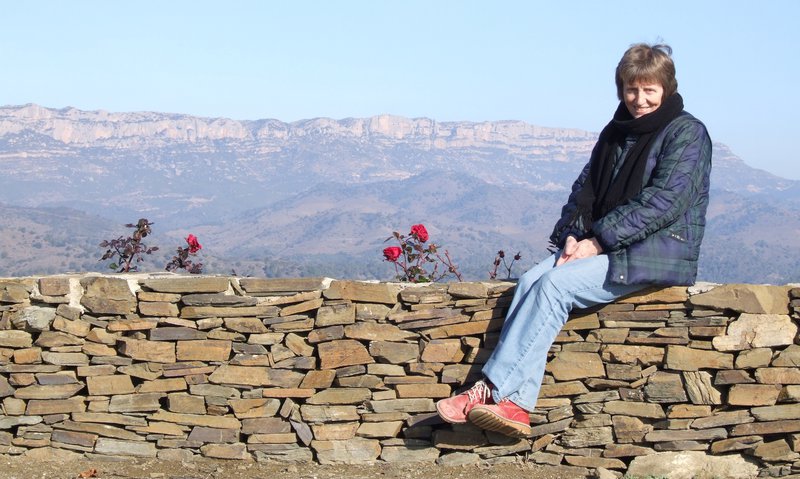Mountain memories
The imposing rocky landscape of the Priorat region persists as a link between the present and darker remembrances of the volunteers who came to fight in the Civil War
Jagged as a dragon's teeth, flat-topped like a launch pad, carpeted with wild flowers or covered with glistening snow, the mountains of Catalonia remain imprinted on the mind. To those who have grown up in their shadows, they are a symbol of home, loved and longed-for whenever abroad. Unaware of the power of mountains, foreigners from flatter lands can also come under the thrall of these rocky giants that leave you with more than just picturesque memories.
When I first visited the hills and mountains of the Priorat in 2001, I was following a research trail, tracing the memories of an English nurse, Patience Darton, who had been in Catalonia during the Civil War. She told me about a cave hospital near La Bisbal de Falset where she had cared for the wounded during the Battle of the Ebro. Her recollections of those days had been strikingly vivid, not just because of the terrible suffering of her patients but also because of the beauty of the landscape that had surrounded the scenes of carnage. When I visited the village after her death and found the cave, it was my turn to feel the pull of the mountains. I returned shortly afterwards to live in the Priorat and continue my research there.
The process of 'recovering the memory' of the Civil War was then in its early days, so 65 years after the Civil War began, it seemed the perfect moment to get together with local historians and create an association, 'No jubilem la memòria' and begin to unearth the story of the war in what had been a very remote region. An important part of its largely unknown history was linked to the months that the volunteers of the International Brigades had been based there, preparing for the Ebro offensive. As well as research, the work of the association included organising conferences and commemorative events. International Brigaders, though elderly and frequently frail, came from many countries to take part. Firm friendships were formed, particularly with those from Britain and America, who stayed with us and revisited the places they had last seen in their youth.
In that spring and early summer of 1938, in the brief lull between a devastating retreat from Aragon and the start of the Ebro campaign, there had been happy days for the Brigaders in the Priorat. There were fiestas with the people of the villages, dancing, wine, and even romance with local girls for a few, all taking place within sight of the mountains where they would soon be fighting, and where some would die. In New York archives, I found photographs and film footage taken in the Priorat during those days, showing the Brigaders as strong young men among the vines and hazels with the mountains as an emblematic, easily recognisable backdrop. The Commander of the Lincoln Battalion, Milton Wolff, came back to the Priorat in 2003 to stand once again on the spot where he had been famously photographed by Robert Capa, and to tell us how he had felt, marching at the head of his men, so many years before. The moving tribute he paid to his comrades was included in the award-winning documentary made by our association.
Contrasting memories
For these men and women, the memories of mountains were shot through with strong, and sometimes contradictory, emotions. Back home again after the Civil War, among their sensuous descriptions of the landscape that surrounded the valley where they had built their temporary camp, they recalled how they would watch as the clouds poured over the cliff faces, “Niagra-like” but “more majestically than any waterfall,” and how “in the late afternoons the face of the rock would glow pink against the dropping sun.”
The warm memories contrasted with the grim realities of the battle in the mountains at the other side of the Ebro where the unforgiving rock offered little shelter from heavy bombardment by Franco's forces. Returning to those sites of fear and loss for the first time after many years could be cathartic for some. Surrounded by a warmly welcoming crowd of people at an unveiling of a plaque on the top of Hill 705, one Welsh Brigader, Alun Menai Williams, was moved to say, “The beautiful panoramic view from the top of that hill cancelled out the bloody view that has polluted my mind for so long.”
My own memories of living in the Priorat are also tinged with mixed emotions. From the diminutive Miloquera to the high plain of La Mola, across the ranges of the Montsant, Llaberia, Cavalls, Pándols –these mountains seem to have permeated my writing, perhaps above all, in the novel, Warm Earth. My love for the region could be given full rein in the scenes set in the Priorat; it underlies the emotions of these fictional women as they experience intense happiness then desperation at the life-changing loss of loved ones.
Now, I spend most of my time in England and the veterans who returned to Catalonia in times of peace are all dead, though not yet forgotten. Like Milton Wolff, who could feel the presence of the men who had marched with him along the road from La Torre de Fontaubella, when I visit the Priorat I look around me at the mountains that have become so familiar and feel twinges of loss at knowing these 'Volunteers for Liberty' are no longer with us. Above all though, I have an overwhelming sense of my good fortune in having lived in such an unforgettable place and having known such remarkable people.
More to read, more to discover
Angela Jackson's novel, Warm Earth, featured recently in Catalonia Today in Michael Eaude's ongoing selection of books looking at Catalonia through foreign eyes:
http://www.cataloniatoday.cat/article/113-books/
920452-recovering-ignored-history-hymn-to-freedom.html.
Warm Earth is now available for Kindle and can be downloaded free from Amazon from March 12-16
For more on the work of No jubilem la memòria see
www.nojubilemlamemoria.cat




